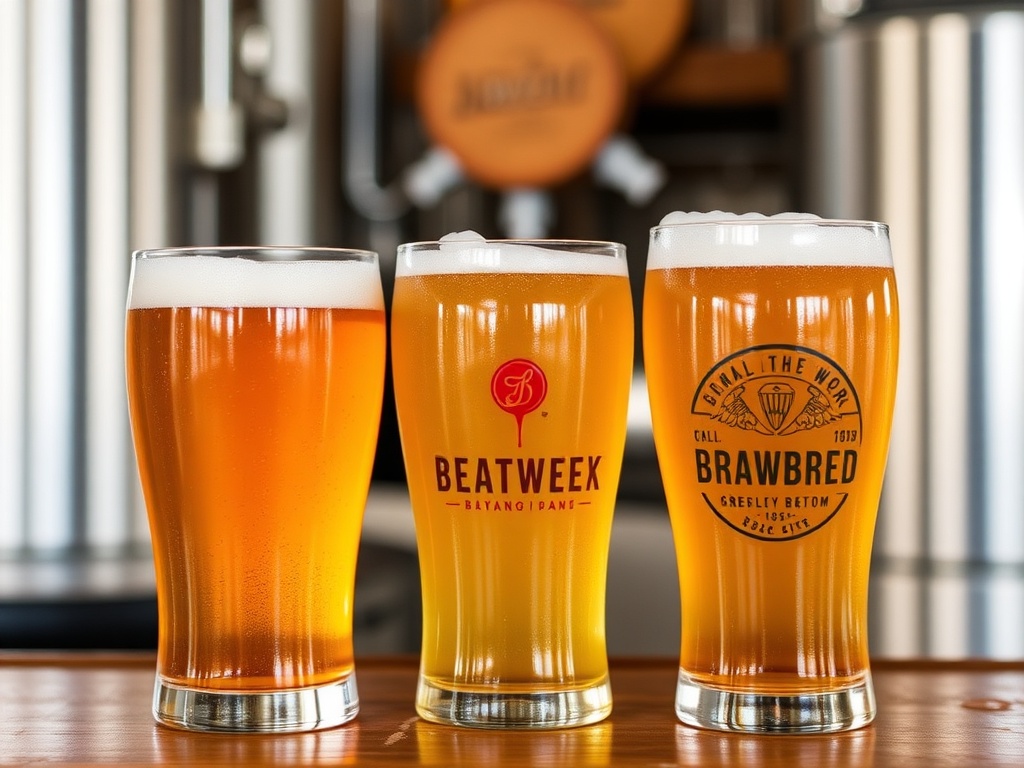Small Craft Brewery Success Stories: How Innovative Approaches Drive Growth and Community Engagement

Introduction
In my experience exploring the world of small craft brewery, I’ve been fascinated by how these establishments are transforming local economies and cultural landscapes through innovation. I want to share what I’ve learned about how a small craft brewery can thrive by adopting creative approaches that foster growth and strong community bonds. From what I’ve studied, success in this industry doesn’t just come from brewing good beer, but from strategic branding, community involvement, and smart use of modern tools.
I’ve found that many small craft brewery owners are redefining traditional methods by embracing new ideas that set them apart. My goal is to highlight some inspiring success stories and practical strategies that can help any aspiring brewery owner or enthusiast understand what it takes to succeed. In this article, I’ll walk you through the key elements that have driven growth and community engagement for small craft breweries around the world.
Innovative Strategies in Small Craft Brewing
Unique Beer Offerings and Branding
In my experience, one of the first steps to standing out as a small craft brewery is crafting a distinctive brand identity. I’ve discovered that successful breweries often experiment with innovative flavors and brewing techniques that appeal to niche markets. For example, I recently visited a small craft brewery that gained popularity by creating limited-edition beers inspired by local ingredients. This approach not only differentiated their products but also fostered a sense of local pride.
From my research, I’ve found that branding plays a crucial role in attracting loyal customers. I recommend investing in eye-catching labels, storytelling, and engaging social media content that emphasizes your brewery’s unique personality. I believe that building a strong brand identity helps a small craft brewery establish a dedicated following, which is vital for long-term growth.
Embracing Sustainability and Innovation
Another innovative approach I’ve seen in successful small craft breweries is the focus on sustainability. From what I’ve learned, many breweries are adopting eco-friendly practices such as composting, water recycling, and using renewable energy sources. I’ve discovered that such efforts not only reduce operational costs but also resonate with environmentally conscious consumers.
In my experience, integrating new brewing technologies—like automated systems or experimental fermentation methods—can lead to unique beer profiles that attract attention. I recommend that small breweries stay open to adopting innovative techniques that improve efficiency and product quality. I believe that a commitment to sustainability and innovation can significantly boost a small craft brewery’s reputation and growth potential.
Community Engagement and Local Support
Building Strong Local Relationships
In my journey studying successful small craft breweries, I’ve found that community engagement is often the backbone of their success. I’ve personally experienced how hosting local events, collaborating with nearby businesses, and participating in festivals can create a loyal customer base. For instance, I visited a small craft brewery that hosted weekly open mic nights and charity fundraisers, which deeply connected them to the community.
From what I’ve learned, fostering strong relationships with local residents, farmers, and artisans helps a small craft brewery become a community hub. I recommend that new breweries prioritize local outreach and create spaces where people feel welcome. I believe that community support is a powerful driver of sustained growth and brand loyalty.
Creating a Sense of Belonging
In my experience, successful small craft breweries often cultivate a sense of belonging among their patrons. I’ve seen breweries that host member clubs, loyalty programs, or exclusive tasting events. From what I’ve observed, these efforts help customers feel personally connected to the brand, turning casual visitors into passionate advocates.
I recommend that small craft breweries invest in creating memorable experiences and encouraging feedback. I believe that when people feel part of something special, they’re more likely to support your business long-term. Building community isn’t just about beer; it’s about creating a shared culture that keeps people coming back.
Leveraging Technology and Social Media
Digital Marketing and Online Presence
In my experience, a robust online presence is essential for any small craft brewery aiming for growth. I’ve found that social media platforms like Instagram, Facebook, and TikTok are fantastic tools for storytelling and showcasing your latest brews. I’ve personally managed small campaigns that increased engagement and brought new visitors through the door.
From what I’ve learned, I recommend investing in professional photos and engaging content that highlights your brewery’s personality. I believe that consistent online interaction can turn followers into loyal customers, especially when combined with promotions or limited-edition releases. Leveraging technology effectively can give your small craft brewery a competitive edge in today’s digital-first world.
Online Sales and Delivery Services
Another strategy I’ve seen work well is expanding sales channels through e-commerce and delivery options. In my experience, offering online merchandise sales, beer subscriptions, or local delivery services can boost revenue and reach a broader audience. I’ve discovered that partnering with delivery apps or setting up an easy-to-navigate website can make a big difference.
I recommend that small craft breweries explore these digital avenues to stay competitive. I believe that embracing technology not only increases sales but also enhances customer convenience and satisfaction. From my perspective, a tech-savvy approach is vital for a small craft brewery to grow sustainably.
Lessons Learned from Successful Small Craft Breweries
Adapting to Market Trends
In my journey, I’ve learned that adaptability is key for any small craft brewery aiming for longevity. I’ve found that successful breweries stay attuned to market trends—whether it’s the rise of sour beers, low-alcohol options, or gluten-free products—and quickly adapt their offerings. I recommend that small breweries conduct regular market research and experiment with new styles to keep customers excited.
From what I’ve seen, flexibility in product development allows a small craft brewery to stay relevant in a competitive landscape. I believe that embracing change and listening to customer feedback are essential for continued growth and innovation.
Financial Planning and Scaling
In my experience, sustainable growth depends heavily on smart financial planning. I’ve discovered that successful small craft breweries often start small with a clear vision and gradually scale up operations. I recommend maintaining tight control over costs, reinvesting profits into equipment, and exploring funding options like grants or crowdfunding.
From what I’ve learned, scaling should be a deliberate process driven by demand and capacity. I believe that careful planning and financial discipline are fundamental for turning a humble small craft brewery into a thriving business. In my opinion, patience and strategic growth are the secrets to long-term success.
References and Resources
Throughout my research on small craft brewery, I’ve found these resources incredibly valuable. I recommend checking them out for additional insights:
Authoritative Sources on small craft brewery
-
Brewers Association
BrewersAssociation.orgThis industry leader provides comprehensive data, trends, and resources specifically for small craft breweries aiming to grow sustainably.
-
Brewbound
Brewbound.comA major publication covering industry news, trends, and success stories that inspire small craft breweries worldwide.
-
Craft Brewing Business
CraftBrewingBusiness.comOffers insights into business strategies, marketing, and operational excellence for small craft breweries looking to scale.
-
National Institute of Food and Agriculture
NIFA.usda.govProvides research on brewing ingredients, sustainability, and innovations relevant to small craft brewery operations.
-
Anne’s Kitchen
AnnesKitchen.comA blog focusing on small-scale brewing techniques, recipes, and community-building tips for small craft breweries.
-
BeerAdvocate
BeerAdvocate.comA community-driven platform with reviews and discussions that can help small craft breweries understand consumer preferences better.
-
Statista
Statista.comProvides statistical data on industry growth, market trends, and consumer behavior related to small craft brewery sales.
-
The Drinks Business
TheDrinksbusiness.comCovers industry trends, innovations, and success stories relevant to small craft breweries.
FAQ
Frequently Asked Questions
What are the key factors that contribute to the success of a small craft brewery?
In my experience, success in a small craft brewery depends on a combination of innovative brewing, strong branding, community engagement, and effective use of digital marketing. Building authentic relationships with customers and staying adaptable to market trends are also crucial. I recommend focusing on these areas to foster sustainable growth.
How can a small craft brewery stand out in a competitive market?
From what I’ve learned, differentiation through unique beer styles, compelling storytelling, and active community involvement helps a small craft brewery stand out. Leveraging social media and creating memorable experiences build brand loyalty. I recommend being authentic and innovative to carve your niche.
What role does sustainability play in the growth of a small craft brewery?
In my experience, sustainability is increasingly important to consumers. Implementing eco-friendly practices can improve operational efficiency and enhance your brand image. I recommend small breweries consider sustainable initiatives as part of their core strategy for long-term success.
How important is community support for a small craft brewery?
I believe community support is vital. Engaging with local residents, hosting events, and collaborating with nearby businesses foster loyalty. I’ve found that a strong local presence can provide stability and help your small craft brewery grow organically.
What are some effective marketing strategies for small craft breweries?
In my experience, social media marketing, storytelling, and hosting community events are highly effective. Additionally, developing a loyal customer program and utilizing online sales channels can significantly boost visibility. I recommend small breweries stay active online and prioritize authentic engagement.
Conclusion
In conclusion, my research on small craft brewery success stories has shown that innovation, community involvement, and strategic marketing are fundamental to thriving in this industry. I believe that embracing new ideas, fostering local support, and leveraging digital tools can transform a small brewery into a beloved local institution. I hope this guide helps you understand some of the key drivers behind successful small craft breweries and inspires you to pursue your own brewing journey with confidence. Based on my experience, I think the future of small craft breweries is bright for those willing to innovate and connect deeply with their communities.
Find out more information about “small craft brewery”
Search for more resources and information:





